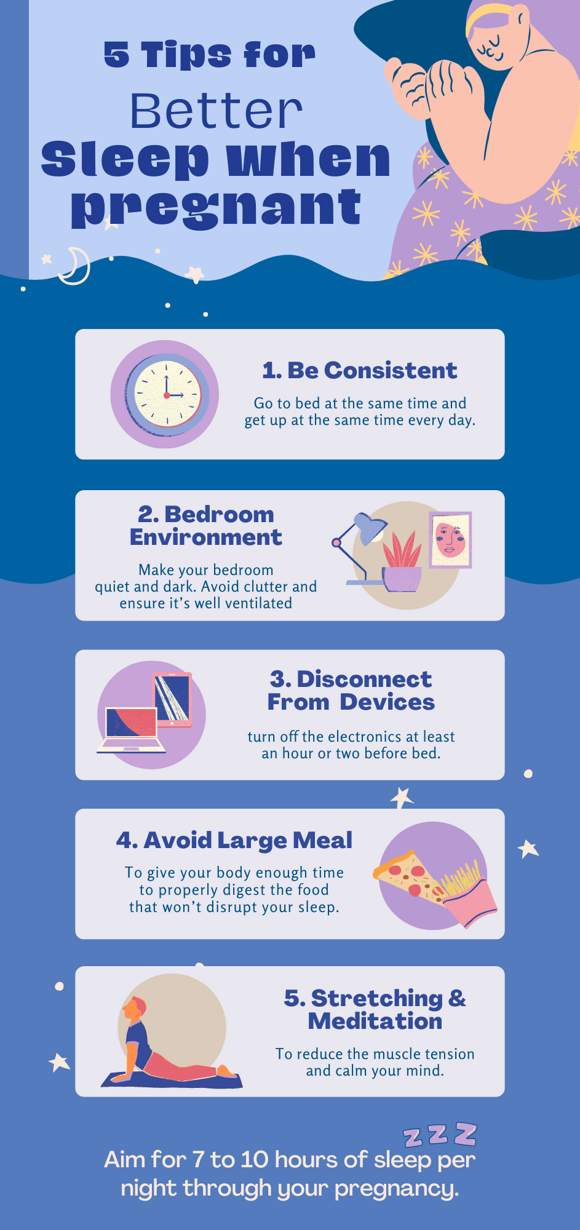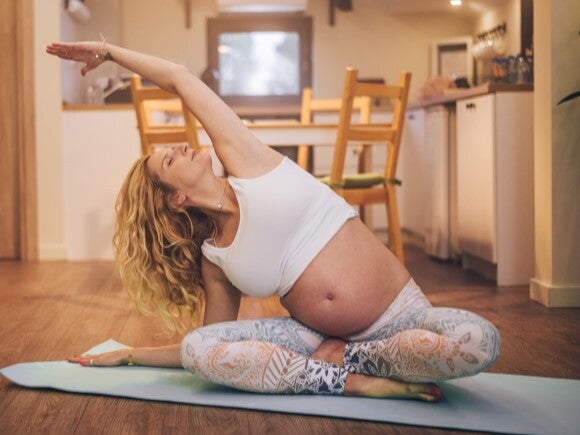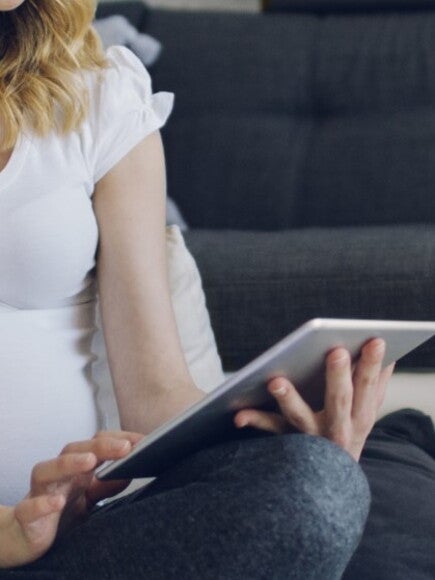As the body undergoes hormonal changes and physical discomfort during pregnancy, sleep patterns and quality can be disrupted, requiring expectant mothers to adapt and find new ways to ensure restful sleep during this transformative time.
Pregnancy and sleep are often two words that struggle to come together harmoniously for most. Pregnancy can have a significant impact on sleep, presenting expectant mothers with various challenges.
- Temperature changes, such as hot flashes and increased body heat, can disrupt sleep and make it difficult to find a comfortable sleeping position.
- Pregnancy can bring about leg cramps, which often occur during the night and can cause discomfort and awakenings.
- Nasal congestion and increased blood volume can lead to snoring and difficulty breathing, further affecting sleep quality.
These challenges, among others, highlight the importance of finding strategies to promote better sleep during pregnancy, such as using pillows for support, practicing relaxation techniques, and maintaining a cool and well-ventilated sleep environment.
Importance of sleep during pregnancy
The amount of sleep needed during pregnancy can vary throughout the three trimesters, and between women. In the first trimester, fatigue is common, and women may require more sleep than usual, often around 7-10 hours per night. During the second trimester, energy levels may improve, and you may find yourself returning to your previous sleep hours, about 7-8 hours per night. In the third trimester, discomfort and frequent bathroom trips can disrupt sleep, so aiming for 7-10 hours of sleep and incorporating naps during the day, and weekends can help maintain adequate rest. It's important for pregnant women to listen to their bodies and prioritise sufficient sleep for their overall well-being.
Getting optimal sleep and creating a comfortable sleep environment will be key:
- Prioritise restful sleep: Getting optimal sleep is crucial for overall health and well-being as it supports physical and mental rejuvenation. Make sleep a priority and allocate enough time for quality rest.
- Establish a sleep routine: Create a consistent sleep routine by going to bed and waking up at the same time each day. This helps regulate your body's internal clock and promotes better sleep quality. Avoid stimulating activities and electronic devices before bed to prepare your mind and body for sleep.
- Create a comfortable sleep environment: Ensure your sleep environment is conducive to restful sleep. Keep your bedroom cool, dark, quiet and well ventilated. Invest in a comfortable mattress, pillows, and bedding that support your body and promote proper alignment. Consider using white noise machines or earplugs to block out disruptive sounds.
- Minimise distractions: Reduce distractions in your sleep environment to promote uninterrupted sleep. Keep electronic devices away from the bed and limit exposure to computer/phone screens (blue light) before sleep. Address any sources of discomfort, such as temperature fluctuations or uncomfortable clothing, to create an optimal sleep environment.
- Nap during the day. Even if it’s only a catnap of 15 minutes, cuddle up under a rug and let yourself drift off. Don’t worry – this shouldn’t stop you sleeping at night.
By following these tips, you can prioritise sleep, create a comfortable sleep environment, and improve the quality of your rest, leading to better overall health and well-being. If these solutions don’t work, talk to your healthcare practitioner.
Safe sleep during pregnancy
Safe sleep during pregnancy is essential for the well-being of both mum and baby. It is recommended to sleep on your side, to improve blood flow to the placenta. From 28 weeks onwards, avoid sleeping on your back, as it can lead to complications . Use supportive pillows and maintain a comfortable sleep environment to promote safe and restful sleep.
Remember, it's important to prioritise comfort and listen to your body. If you have concerns or specific medical conditions, consult with your healthcare provider for personalised advice on the best sleeping positions during pregnancy.
Here are the pregnancy sleeping positions to avoid during the different trimesters of pregnancy:
First Trimester:
For the most part, your sleeping position won’t change much in the first trimester as your baby is still very small. As the pregnancy progresses, it can become uncomfortable sleeping on your stomach, and potentially put pressure on the growing uterus.
Second and Third Trimesters:
Sleeping on your back during pregnancy: This position can compress major blood vessels, potentially reducing blood flow to the baby and causing dizziness or shortness of breath.
Lying flat on your stomach: Like sleeping on your back, this position can lead to discomfort and reduced blood flow.
Sleeping positions during pregnancy
Finding the most comfortable sleeping positions during pregnancy is essential for a restful night's sleep. The best sleeping position during pregnancy is “SOS” (sleeping on your side) and is generally recommended throughout your pregnancy as it improves blood circulation to the placenta and reduces the risk of complications.
- You can sleep on your left or right side, comfort is most important.
- Placing a pillow between the knees can provide additional support and alleviate pressure on the hips.
- Sleeping on the side with a pillow under the belly can also enhance comfort.
Tips for sleeping during pregnancy
Exercise regularly
- Exercise and being active is part of a healthy pregnancy journey – it’s a great way to relax and will help you prepare for what lies ahead in childbirth. Consult your doctor before starting any new regime or if you have any queries;
- Find an activity you enjoy and build it into your schedule;
- Try pregnancy pilates – this can help tone and strengthen specific muscles you’ll be using during birth and with a newborn (you may want to start on those pelvic floor exercises if you haven’t already!);
- Swimming is a great pregnancy exercise as the water supports your growing belly comfortably and you can adjust your pace to suit the stage of your pregnancy;
- Take a walk before dinner. This will also help you relax and make it easier for you to sleep;
- Don’t strain yourself – it’s perfectly safe to exercise provided you don’t push yourself too hard;
- Stay within weight gain guidelines. The heavier you are, the more tired you’ll feel;
Manage your activity for a restful day
- Pull up a chair. Whether on the job or doing household chores, take a seat when you need to, don’t overdo it;
- Prioritise activities and cut out non-essential chores;
- Reassess your socialising and ask family and friends not to call late in the evening. Explain that you’re trying to get plenty of rest before your baby arrives;
- Try to do restful activities just before bed. Try a bath, a massage, reading or a walk in the garden or around the block. Avoid falling asleep in front of the TV or spending a lot of time online.
Relax
- Sleep problems can be linked to anxiety, which may increase as the birth approaches.
- If you are anxious, raise your concerns with your healthcare practitioner – knowing the answers to common questions can make you feel much more confident and relaxed;
- Make the most of antenatal classes to prepare yourself and help you relax.
Manage your diet
- Eat frequent, small meals. They’ll give you energy all day and will make it more comfortable as the room inside your stomach shrinks as your baby grows bigger. Avoid big meals just before bedtime;
- Power lunch. Boost your energy with sliced chicken breast or a bowl of lentil soup that’s high in iron and protein, to get you through to your mid-afternoon snack;
- Snack smart. Try dried fruit or fortified cereal for a carbohydrate boost, or nuts for essential fats, to fuel the body;
- Avoid rich or fatty foods and stimulating drinks such as caffeinated soft drinks. Instead, opt for water, fruit and vegetable juices or fruit smoothies to keep you hydrated and energised healthily.

FAQs
When should I stop sleeping on my stomach during pregnancy?
It is generally recommended to stop sleeping on your stomach during pregnancy around the second trimester. As your pregnancy progresses, sleeping on your stomach can become uncomfortable and potentially put pressure on the growing uterus. By 28 weeks, transitioning to sleeping on your side is the safest way to sleep while pregnant.
When should you stop sleeping on your back in pregnancy?
It is generally recommended to stop sleeping on your back during pregnancy around the second trimester and definitely by week 28. Sleeping on your back can potentially compress major blood vessels, reducing blood flow to the baby and causing discomfort. It's best to transition to sleeping on your side, for better circulation and safety.
Can I sleep on my back during pregnancy?
Sleeping on your back during pregnancy is generally not recommended, especially as the pregnancy progresses, and beyond 28 weeks. It can potentially compress major blood vessels, reducing blood flow to the baby, and causing discomfort. It's best to transition to sleeping on your side, for better circulation and safety.
How to sleep with rib pain during pregnancy?
You have the flexibility to sleep on either your left or right side during pregnancy. To enhance comfort and ease while sleeping on your side, try bending your knees and placing a pillow between them. Additionally, placing a pillow under your belly can provide extra support for a more comfortable sleep.
Sources
Pregnancy Birth and Baby. Accessed at: https://www.pregnancybirthbaby.org.au/sleep-during-pregnancy
Red Nose Australia. Accessed at: https://rednose.org.au/article/sleep-on-your-side-when-baby-is-inside




